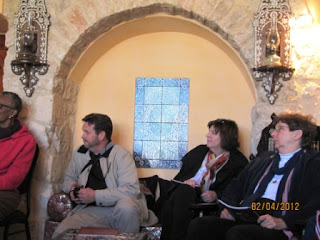 |
| Hana politely declining the Coptic bishop's invitation to tea |
 |
| In the Holy Sepulcher courtyard |
I didn’t take pictures during, but take my word for it—the
priests are decked out in finery and the chanted, non-instrumental music,
especially that of the Armenians, is glorious. For group after group I have
brought to visit the church on Sunday morning, first with Daniel Rossing and
now with Hana, it is a mind-altering experience.
The building itself is ugly from the centuries without
renovations, because the various groups have such difficulty agreeing on how
they will renovate. The edicule built over the place where Jesus’ tomb once lay
is in danger of breaking and falling, and most times the church is so
jam-packed with tourists it is very difficult to pray or even think about God.
But on Sunday mornings worship is going on from so many corners in so many
tongues that it becomes a Pentecost experience, guaranteed.
Hana talked at length about the miracle that the groups
manage to get along at all, and only have fights every couple of years. We all
know that it is difficult enough to get along in our home churches where
everyone is supposed to be in the same denomination and the church isn’t a holy
site for anyone else. So much harder when there are hundreds of years of
history keeping groups at odds with one another, and when the stakes are so
high.
 |
| View of Jerusalem from Dominus Flevit |
When we go to Dominus Flevit Church on the Mount of Olives,
which commemorates Jesus weeping over Jerusalem from the Mount of Olives, this
is part of what I imagine him weeping over, his own worshippers in future
generations whose disagreements make Christianity’s most important site a place
of contention.
I have an oft-worn necklace with these Hebrew words from
Psalm 122: “Pray for the peace of Jerusalem! May they who love her prosper.” It
reminds me always to remember and pray. Because if there could be peace in
Jerusalem, on any of the many levels where there is not, there could be peace
anywhere.
As we were walking through the Muristan toward our lunch
appointment, Claudia and Hana in the front and Jane and I in the rear, I
remarked that suddenly here we were, two tour guides and two tour leaders, and
all four women. But it was just about to get even better.
Claudia hadn’t told me where we were having lunch. Imagine
my surprise when we walked up to the door of Wujoud ("Existence"), the museum/restaurant/cultural
center recently opened by Nora Kort, the Greek Orthodox Palestinian woman who
founded Melia, the women’s cooperative needlework project near the New Gate,
where I have for years taken groups to buy beautiful stoles, purses, table
runners, and other creations cross-stitched by West Bank women.
 |
| Nora telling us about Wujoud |
 I had met Nora last summer when I came to buy a very special
gift for Carol Newsom on behalf of all her doctoral students over the past 20
years. Nora had told me then about Wujoud, but I hadn’t seen it yet. Imagine Hana’s
surprise as well, because she had been wanting to meet Nora. Imagine Claudia’s
surprise when Nora and I embraced and started talking like we were old friends.
This is what a small town Jerusalem is, even though it is (at least by legend)
the center of the world.
I had met Nora last summer when I came to buy a very special
gift for Carol Newsom on behalf of all her doctoral students over the past 20
years. Nora had told me then about Wujoud, but I hadn’t seen it yet. Imagine Hana’s
surprise as well, because she had been wanting to meet Nora. Imagine Claudia’s
surprise when Nora and I embraced and started talking like we were old friends.
This is what a small town Jerusalem is, even though it is (at least by legend)
the center of the world.  |
| Sitting in the window seat |
Nora is a social worker by background and an outstanding
leader especially on behalf of Palestinian women. She was one of three women
included in the writing of Kairos Palestine, a document written by Palestinian
Christians appealing to the churches of the world to help speak out for the
freedom and rights of Palestinians, who continue to live (now for 45 years)
under Israeli occupation. After lunch she invited us into a meeting room that
had been designed and furnished as a traditional Palestinian home, and told us
about her work and life as a Palestinian.
 |
| Group Photo with Nora and her staff |
She told many stories—she’s extremely dynamic. But one that
sticks in my mind in particular was about when she was speaking in Houston one
time. She was making the point that Christianity has been native to this land
since the first century. So many Americans assume that all Palestinians are
Muslims (and therefore that they are terrorists, another huge assumption). So
the question was asked in Houston, “When did you become a Christian?” Her
answer: “Have you heard of Pentecost?”
Mitri Raheb, the
Lutheran pastor we will see tomorrow, often says that his
great-great-great-great-great grandmother babysat for Jesus. This is something
very hard to get across: that there have been Christians living here for two
thousand years, and that they are in danger of becoming non-existent here
because the situation is so difficult, and so many find it easier to emigrate elsewhere
to raise their children in peace. Someone said to me as we were leaving, “Oh,
now I get it!”
No comments:
Post a Comment
Post a comment here...